Pascal’s Endgame
By:
November 16, 2010
Animals have often been our tools. Riding a horse, or an emu, is faster than walking. Taming a falcon will convince it to hunt your dinner instead of its own. Porpoises might, if you are a beloved classic sitcom star, push you to shore when asleep and adrift. But these days we’re also using animals to augment our epistemology, in a deadly race between perception and perfection.
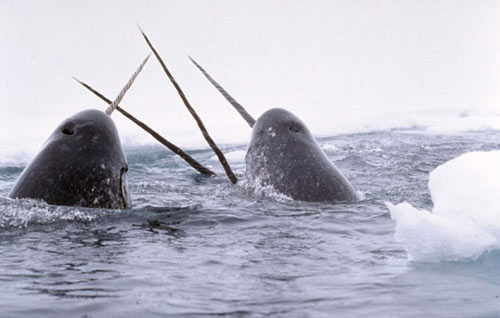
[Narwhals surfacing]
Some narwhals have recently become scientific instruments. The narwhal is an arctic whale, known by its distinctive single whirled tusk, and probably only familiar to most of us from ceiling-hung skeletons in the natural history museum. But they are not fossils, they live in extreme cold under the edges of the arctic ice, where they feed on various fish and invertebrates. Because of their ability to dive to inhospitable-to-us depths, we have outfitted them with transmitters so they can send data back to our computers, data that details how the Arctic Ocean is heating up. Over at gearfuse.com, HiLobrow editor Matthew Battles points out the irony in that the narwhals’ tusks are many times more sensitive than the sensors we’ve attached to them; but we lack the right kind of uplinks to tap their transmissions directly.
Helpful, these creatures. Helping us measure what we cannot reach on our own. Yet more and more often, helpful not by their cooperation, but in their absence. The poison in the poison dart frogs is no match for the chytrid fungus, or the environmental conditions that have encouraged its spread. The honeybees, which despite having brains the size of grass seeds solve mathematical problems our computers cannot yet model, are victims of a precipitous decline. More and more brown bats, who among other activities perform the essential function of keeping the insect population in check, have been succumbing, cave by cave, to white-nose disease. The spreading phytoplankton blooms, visible even by satellite, reflect ocean temperature increases that are becoming the norm rather than the exception. The devils are attacking each other in dismay. The roaches, meanwhile, are doing fine, and the kudzu is thriving. The list goes on and on.
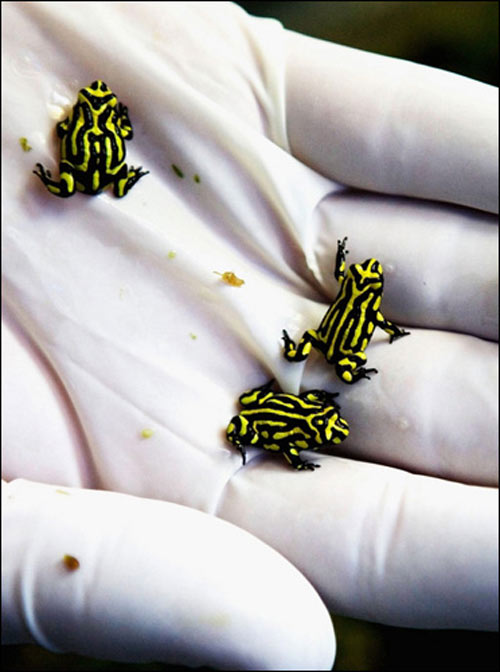
[Baby Corroboree Frogs on palm of reptile keeper Stuart Kozlowski, Taronga Zoo, Sydney, Australia.]

[Honeybee colony]
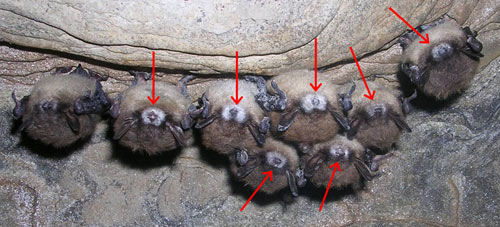
[Bats with White-Nose Disease]
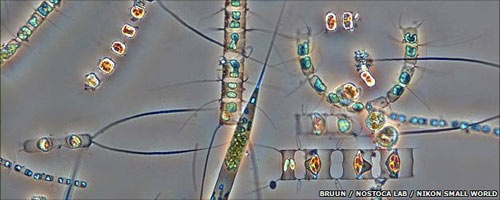
[Phytoplankton]
And with all these presences and absences, with the overabundance of some and the disappearance of others, it’s not only that things are changing, but that the rate of change in our natural world is increasing faster than its current inhabitants can adapt to it.
And what are we doing? When we are not overfishing, paving, clearcutting, drilling, emitting, genetically engineering, etc.? We are measuring. We are using the narwhals to gather data. We are recording the absence of amphibians, we are dissecting any bee bodies we can find, looking for microscopic clues. We are checking caves off a list, and mapping the closures. Worldwide it is business as usual, while we wait for all the facts to come in.
In a way it makes sense: shouldn’t we wait until we’re certain and then decide what to do? But what if, by the time we’re certain, a choice has been made by default? And what if that default leads to the worst possible consequences?

[Blaise Pascal, mathematician and philosopher, 1623 – 1662]
Blaise Pascal knew about this tendency of ours, and constructed a neat little game: a wager. His concern was heaven and hell, and and probabilistic ethics. Let’s enter his world for a moment, and examine the bet and the preconditions. The endgame is this: heaven is win-win, and hell is lose-lose. Your actions here and now will determine where you go — but that’s not all that factors into the choice. There is uncertainty built into the system with the idea of god, who wants you to behave. God will reward you with heaven if you do, and punish you with hell if you don’t.
So, you must decide: if there is a god, you had better behave, because if you do you’ll be allowed into heaven, and if you don’t you’ll be sent to hell. But what if there is no god? That means you don’t have to behave because he won’t punish you, right? Might as well live it up, there’s no heaven either! But built into the wager is a key uncertainty: the existence of god is unknown. By the time you’re up at the pearly gates and can determine their degree of hypothetical reality, it’s too late to change, you’re going up or down based on what has already happened. So, the thought-experiment concludes, better to behave. Because what you want, in this wager, is not to gain the best short-term deal, but to avoid the worst permanent consequences.

What is our corresponding wager? How we should live on this planet. What is our corresponding uncertainty? We don’t know everything about everything. We don’t know everything about how our actions are affecting the environment, and those actions include overpopulation, reliance on petroleum, agrobusiness, the industrial economy, growth as a business philosophy, and many, many more. These include big, global actions, as well as small, very personal ones; actions we would need to pursue as a species, and actions which affect our day-to-day existence and the very meaning of our individual lives.
Our particular endgame breaks down this way: the win-win is to maintain an environment where we can thrive, including the thriving of the flora and fauna and diversity that provide us, and themselves, succor and delight. (And we would be maintaining it, not just living in it; there is no aspect of our environment that is not now in some sense managed by us.)
The lose-lose is to ruin the environment so it either no longer supports human life, or no longer supports it very well, turning everything into an homogeneous no-man’s-land, of scavengers like cockroaches and rats, of overall increasing temperatures, of severely fluctuating microclimates, and of widespread impoverishment, and which dips periodically and perhaps frequently into problems of even more cataclysmic proportions, like floods, like gas explosions, like oil leaks, like plagues, like resource wars.
How to avoid the worst consequences? As Pascal advised, we need to hedge our bet. We need to assume that our actions, especially our industrial actions, are causing rapid and unprecedented climate change — as the climate scientists have been insisting is the case for some time — and act now to stop and counterbalance these effects. I don’t mean stop measuring, we need to constantly continue that. We don’t know everything, but we’re not low on data; and we’re very low on time. We need to act while we continue measuring. If we wait for our data set to be completed to perfection, it will be too late; the default decision will have been made, and we will be stuck with its consequences.
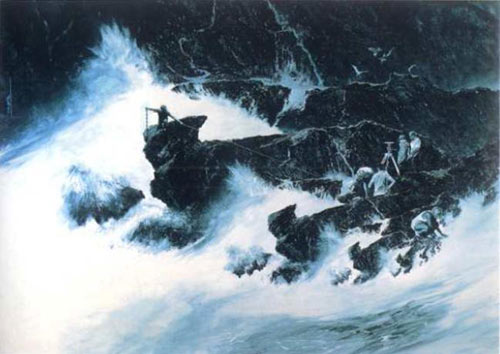
[Coastline Measure, Mark Tansey, 1987]
In this, our dream of a perfect epistemology mirrors the situation of Aylmer in Nathaniel Hawthorne’s 1843 short story, The Birthmark. Aylmer’s quest is for perfect beauty. He has married Georgiana, perfect except for a small birthmark resembling the outline of a hand on her cheek. A chemist, Aylmer works feverishly on a concoction that will fade the mark and match Georgiana to his dream of perfection. She’s so close! But Aylmer is not assuaged with asymptotes. As he tries various combinations, the mark tingles but does not disappear. Undaunted, Aylmer finally succeeds in synthesizing a successful solution; as he explains it to Georgiana, “the draught cannot fail.” And it does not. But she does: as she drinks, the birthmark disappears, and in the next moment she dies. He is left with his dream of perfection, fulfilled in its perfect absence.
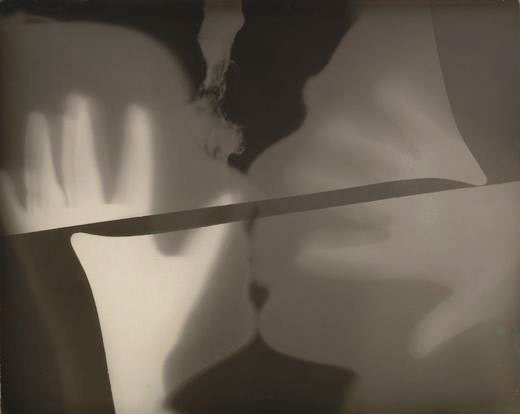
[Rayograph, Man Ray, 1922]
What is this to us? We dream of perfect knowledge, of scouring worlds known and unknown for the knowledge within and without. Meanwhile, our world goes on, actions are taken, consequences incurred. (And they’ll be incurred even faster once India, China and all of Africa bump up their industry and consumerism to so-called “first-world” levels.) But when we reach that perfect convergence, if it even exists, where finally all the facts are in, when we’ve measured every aspect of every thing, when the last narwhal has ceased transmitting because the arctic waters have become too warm for it to survive, the habitats we’ve so exhaustively measured will be permanently, fatally altered and all our friends will be gone. And the worst consequences will remain, ours to inherit.
And on the surface of that calibrated, emptied, ruined world there will appear briefly in outline, perhaps recorded as a heat-signature by one of our infrared satellites, a faint yet perfectly distinct print, of a human hand.

[Handprint, Chauvet Cave, France]
